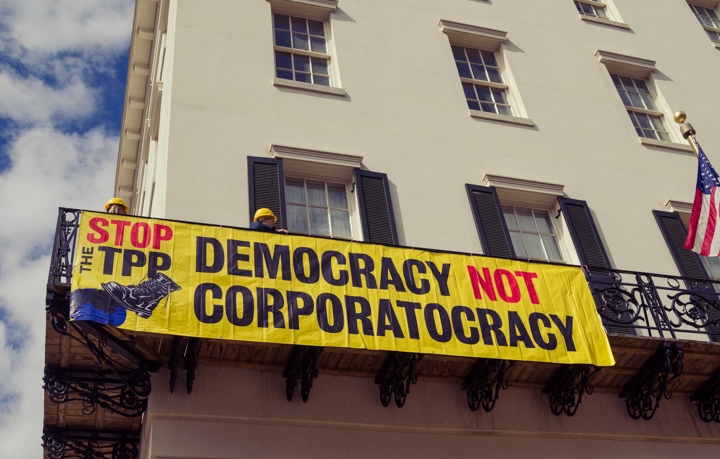
(Photo: Backbone Campaign / Flickr)
Since 2009, the year the United States government officially decided to participate in the TransPacific Partnership (TPP) agreement, U.S. officials, including President Barack Obama, have gone out of their way to tout the trade pact as “the most progressive trade deal in history.” Few claims, however, could be further from the truth. In fact, the TPP’s chapter on investment protection and its dispute settlement mechanism—by which foreign investors can sue sovereign states in closed-door, international courts—demonstrate that the TPP shares a great deal in common with recent free trade agreements, and not in a good way.
More specifically, the TPP is a free trade pact that is firmly rooted in one of the most notorious provisions of the North American Free Trade Agreement (NAFTA), its Chapter 11 on investment. Designed to protect foreign investors and give corporations the capacity to operate in ways that ensure their profits are maximized and risks minimized, the TPP now threatens to extend that corporate impunity on an unprecedented scale.
Until a few years ago, the legal framework enumerated in Chapter 11 existed in comfortable darkness. Thanks to the dedicated organizing of civil society organizations around the globe and advocacy of a small group of responsible government officials and parliamentarians, this is no longer the case. In the last decade, three Latin American countries (Venezuela, Bolivia, and Ecuador) have publicized their frustrations with the power that corporate entities have amassed through the inclusion of what are known as “InvestorState Dispute Settlement” (ISDS) clauses by withdrawing from the World Bank’s International Center for the Settlement of Investment Disputes (ICSID), the most common tribunal in which countries that are parties to such pacts can be sued by private corporations.
Spurred on by civil society, it is no longer abnormal for countries that are parties to a given Bilateral Investment Treaty (BIT) to denounce the inclusion of ISDS provisions in those agreements. Ecuador, for example, recently began a comprehensive process of auditing all of the BITs to which it is a party, as well as the suits it is involved with at the ICSID. This review process is now being emulated in other countries, like Poland, while governments in places like South Africa, Indonesia, and India have pledged to cancel many of their BITs.
A changed political environment has helped to push the problems of the ISDS system to the forefront of the civil society debate about the TPP and other largescale free trade negotiations, such as the Transatlantic Trade and Investment Partnership (TTIP) and the the EU-Canada Comprehensive Economic and Trade Agreement (CETA). Although many believe the time has come to radically change and rebalance the international legal regime on investment by annulling or renegotiating international investment agreements, the 12 countries that are parties to the TPP, most notably the United States, have continued to ignore such criticisms. This fact alone is reason enough to oppose the ratification of the TPP.
The free trade model that the TPP today embodies goes back at least to the early 1990s, when NAFTA was negotiated and approved by Canada, Mexico, and the United States. [For more on the relationship of NAFTA to the TPP, see Alejandro Álvarez’s piece in this issue of the Report.] Advocates of that pact contended that it would bring prosperity to Mexico by increasing employment opportunities and living standards across the board.
However, the opposite has happened.
By removing trade barriers, NAFTA took away protections enjoyed by Mexico’s domestic food producers, precipitating greater food insecurity, widespread loss of agricultural livelihoods, and migration, both internally and abroad. Moreover, by removing investment barriers, the deal made it even more profi table for large corporations to set up factories along the U.S.-Mexico border, and then re-export finished goods back to the United States at a lower price. Because the portions of NAFTA dealing with labor protections were extremely weak, the jobs created in Mexico’s maquiladoras have remained low-paying ones over the last two decades and basic labor rights, like the right to form a union, often go ignored.
What’s more, since under the terms of NAFTA national governments cannot impose conditions on foreign investors to use domestic suppliers, the value chains forged between other sectors of the Mexican national economy and new foreign investment have been minimal. (NAFTA’s investment chapter contains a little known clause, known as the “Prohibition of Performance Requirement,” by which governments are not allowed to actively promote connections between foreign investment and national production chains in order to boost national employment.) The result of this all has been a boom in exports from Mexico’s manufacturing and maquiladora sectors that have had very few positive ripple effects in other parts of the Mexican economy.
…
Read the full article on Taylor and Francis Online’s website.
